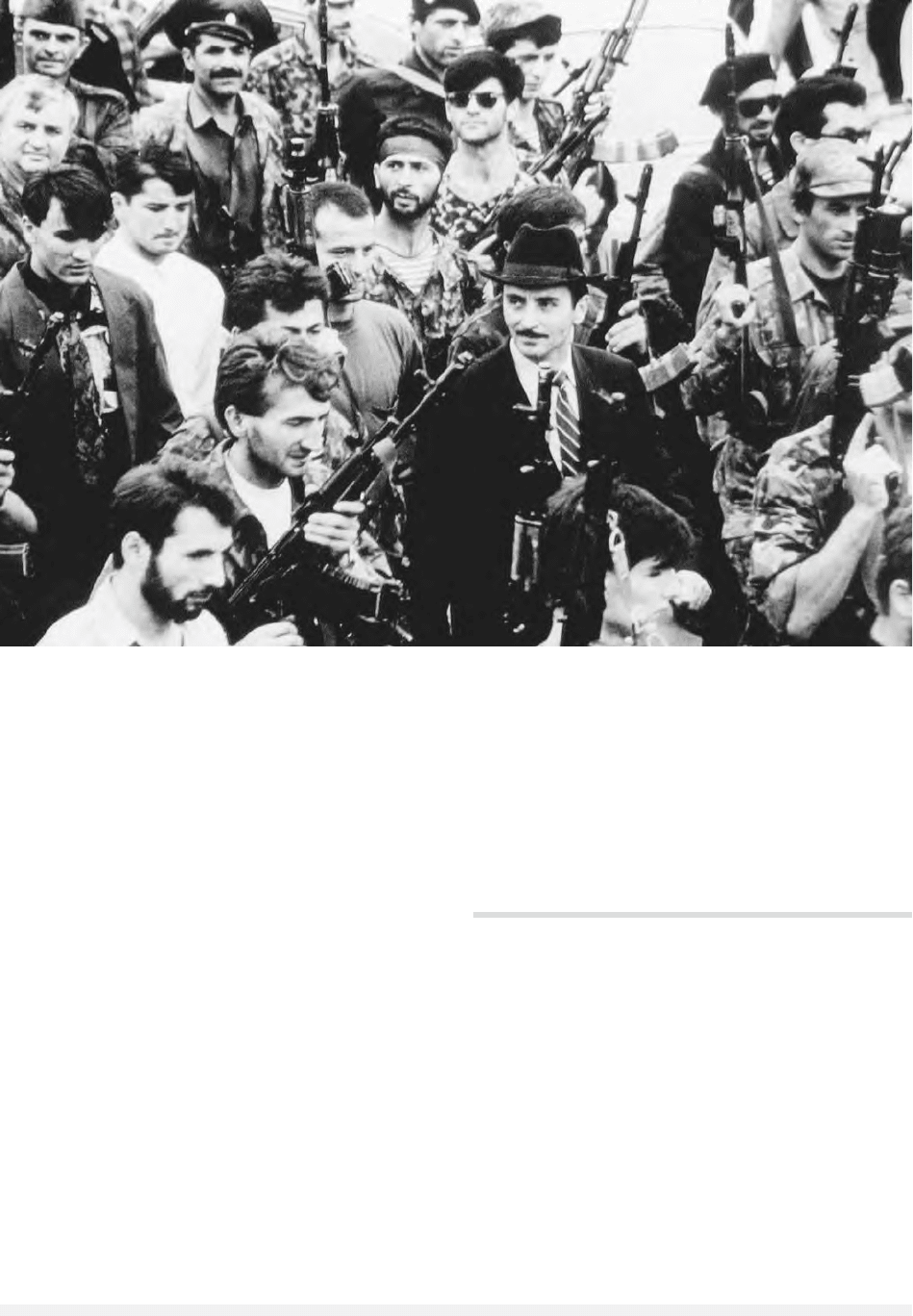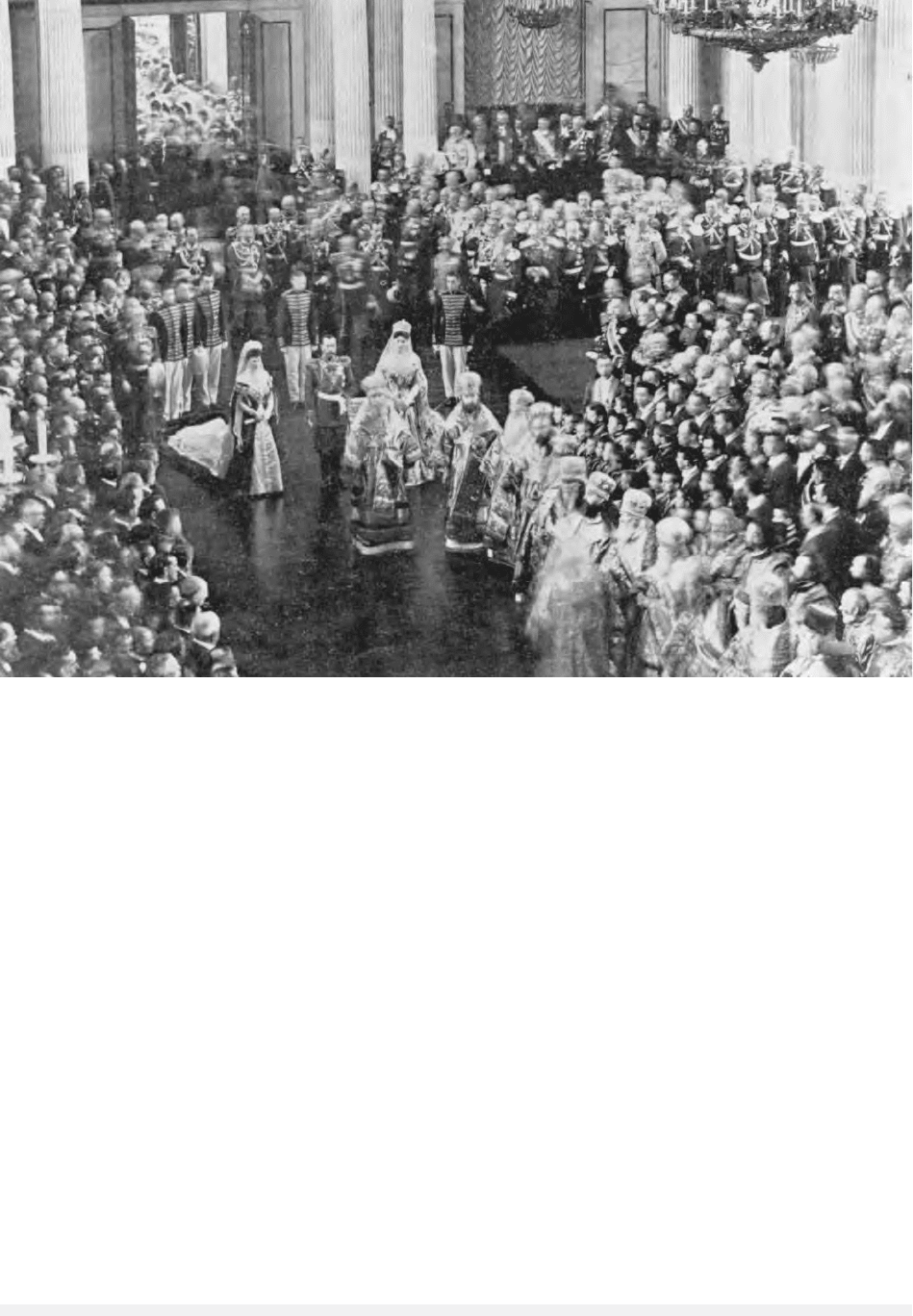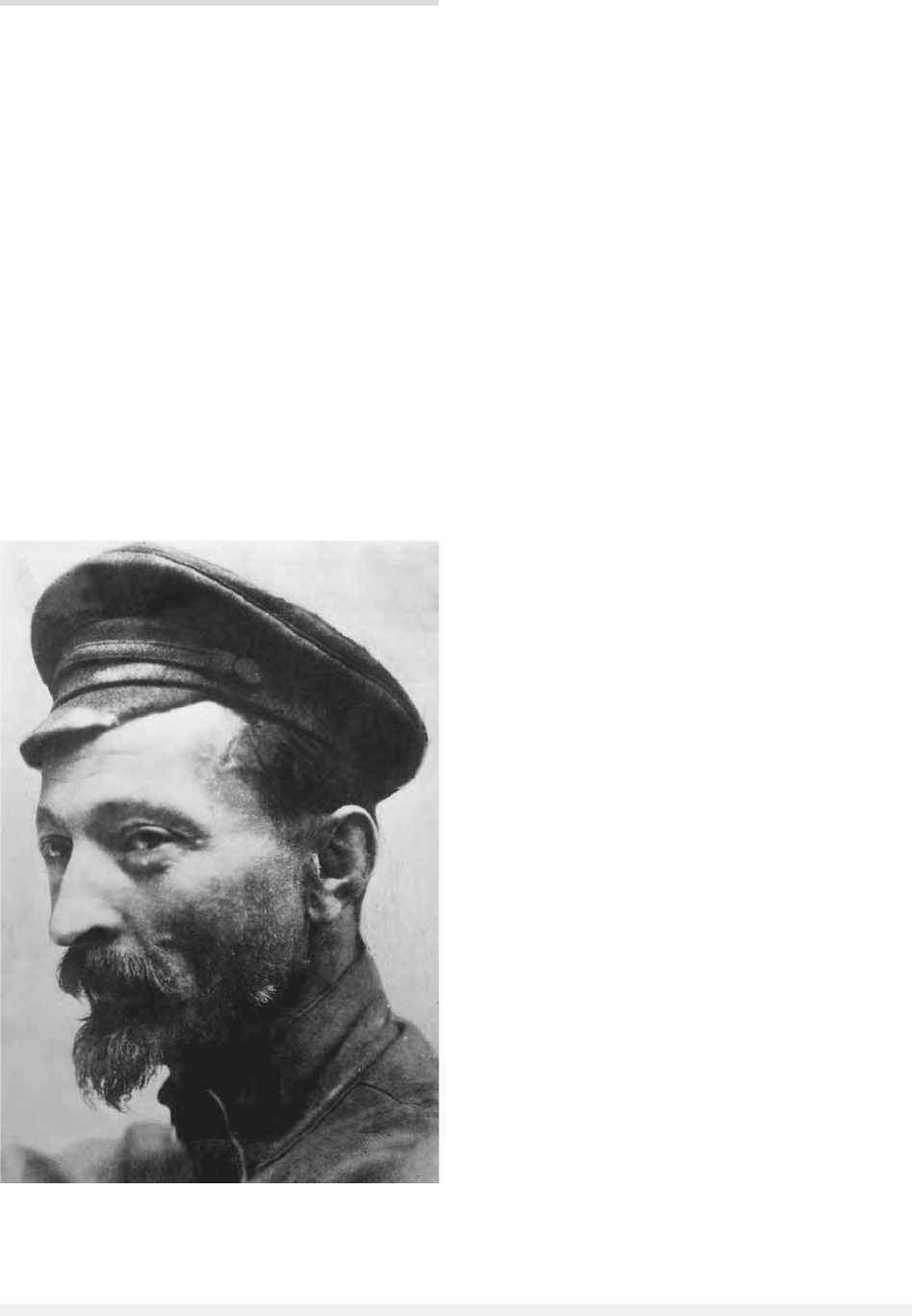Encyclopedia of Russian History
Подождите немного. Документ загружается.


ian-speaking industrial cadres as a result of his eth-
nocratic policies. In mid-1993, Dudayev disbanded
the opposition-minded Constitutional Court and
dispersed the parliament (an example that he then
advised Yeltsin to follow). From then on, he was
faced with armed rebels, aided by Moscow hard-
liners. Initially a secular ruler, by late 1994 he
shifted to Islamist rhetoric. In December 1994, af-
ter failed negotiations and a botched attempt by
pro-Moscow rebels to dislodge him, Chechnya was
invaded by federal troops. Dudayev had to flee
Grozny and thereafter led the armed resistance in
the mountains, up until his death in a rocket at-
tack by federal forces in April 1996.
See also: CHECHNYA AND CHECHENS
BIBLIOGRAPHY
Dunlop, John B. (1998). Russia Confronts Chechnya: Roots
of a Separatist Conflict. Cambridge, UK: Cambridge
University Press.
Lieven, Anatol. (1998). Chechnya: Tombstone of Russian
Power. New Haven, CT: Yale University Press.
D
MITRI
G
LINSKI
DUGIN, ALEXANDER GELEVICH
(b. 1962), head of the Russian sociopolitical move-
ment Eurasia; editor of the journal Elementy; and a
leading proponent of geopolitics and Eurasianism
with a strong Anti-Western, anti-Atlantic bias.
In the late 1970s Dugin entered the Moscow
Aviation Institute but was expelled during his sec-
ond year for what he described as “intensive activ-
ities.” He joined the circles associated with a Russian
nationalist movement of the 1980s and at the end
of the 1980s was a member of the Central Coun-
cil of the national-patriotic front “Pamyat” (Mem-
ory), then led by Dmitry Vasiliev. With the end of
DUGIN, ALEXANDER GELEVICH
413
ENCYCLOPEDIA OF RUSSIAN HISTORY
General Dzhokhar Dudayev and armed supporters in Chechnya. © Tchetchenie/CORBIS SYGMA

the Soviet Union, Dugin emerged as the chief ide-
ologue of the writer Edvard Limonov’s National-
Bolshevik Party, a fringe movement that cultivated
political ties with alienated youths. Dugin also be-
came a major figure in the “Red-Brown” opposi-
tion to the Yeltsin administration. He joined the
editorial board of Alexander Prokhanov’s Den (Day)
and then Zavtra (Tomorrow) after 1993. Dugin’s
writings combine mystical, conspiratorial, geopo-
litical, and Eurasian themes and draw heavily on
the notion of a conservative revolution. This ideol-
ogy emphasizes the Eurasian roots of Russian mes-
sianism and its fundamental antagonism with
Westernism and globalism, and outlines the way
in which Russia can go about creating an alterna-
tive to the Western “New World Order.” This al-
ternative is totalitarian in its essentials. Drawing
heavily upon German geopolitical theory and Lev
Gumilev’s Eurasianism, Dugin outlined his own
position in Foundations of Geopolitics: The Geopolit-
ical Future of Russia (1997). In 1999 Dugin cam-
paigned actively for the victory of a presidential
candidate who would embrace his ideas of an anti-
Western Eurasianism and supported Vladimir Putin
as the “ideal ruler for the present period.” Work-
ing closely with Gleb Pavlovsky, the Kremlin’s spin
doctor, Dugin actively developed an Internet em-
pire of connections to disseminate his message. In
the wake of Putin’s alliance with the United States
in the war against terrorism, Dugin has called into
question the president’s commitment to Eurasian-
ism and rejoined the opposition. Dugin has been
particularly adept at exploiting the Internet to
spread his message through a wide range of media.
See also: GUMILEV, LEV NIKOLAYEVICH; NATIONALISM IN
THE SOVIET UNION
BIBLIOGRAPHY
Shenfield, Steven D. (2001). Russian Fascism: Traditions,
Tendencies, Movements. Armonk, NY: M. E. Sharpe.
Yasmann, Victor. (2001). “The Rise of the Eurasians.”
RFE/RL Security Watch 2 (17):1.
J
ACOB
W. K
IPP
DUMA
Known officially as the State Duma, this institu-
tion was the lower house of the Russian parlia-
mentary system from 1906 to 1917. In Kievan and
Muscovite times, rulers convened a “boyars’ duma”
of the highest nobles to provide counsel on major
policy issues. During the 1600s this institution fell
into disuse, but late-nineteenth-century liberals
lobbied for establishment of a representative body
to help govern Russia. After the Revolution of 1905,
Tsar Nicholas II agreed to form an advisory coun-
cil, the Bulygin Duma of August 1905. However,
revolutionary violence increased in the next two
months, and in his October 1905 Manifesto the tsar
reluctantly gave into the urgings of Sergei Witte to
grant an elected representative Duma with full leg-
islative powers.
This promise, plus other proffered reforms,
helped split the broad revolutionary movement,
winning over a number of moderates and liberals.
With violence waning, the tsar weakened the au-
thority of the proposed Duma by linking it with a
half-appointed upper house, the State Council; by
excluding foreign and military affairs and parts of
the state budget from its purview; and by weight-
ing election procedures to favor propertied groups.
Moreover, at heart Nicholas never accepted even
this watered-down version of the Duma as legiti-
mate, believing it an unwarranted infringement on
his divine right to rule. On the other hand many
reformers saw the Duma as the first step toward
a modern, democratic government and hoped to ex-
pand its authority.
FIRST AND SECOND
DUMAS, 1906–1907
Based on universal male suffrage over age twenty-
five, elections for the First Duma were on the whole
peaceful and orderly, although the indirect system
favored nobles and peasants over other groups. The
revolutionary Social Democrats and Socialist Rev-
olutionaries boycotted the elections, while the lib-
eral Constitutional Democrats (Cadets) conducted
the most effective campaign. The latter won a plu-
rality of members, and peasant deputies, though
usually unaffiliated with any party, proved anti-
government and reformist in their views. Perhaps
too rashly, the Cadet deputies pursued a con-
frontational policy toward the government, de-
manding radical land reform, extension of the
Duma’s budgetary authority, and a ministry re-
sponsible to the Duma. After three months of bit-
ter stalemate, Nicholas dissolved the Duma.
Elections to the Second Duma in the fall of 1906
worsened the political impasse. Although the
Cadets lost ground, radical parties participated and
elected several deputies, and the peasants again re-
DUMA
414
ENCYCLOPEDIA OF RUSSIAN HISTORY

turned oppositionist representatives. Openly hostile
to the government, the Second Duma, like the first,
proved unable to find a compromise program and
was also dissolved after several months.
THIRD AND FOURTH
DUMAS, 1907–1917
Under the Fundamental Laws adopted in 1906 as
a semi-constitutional structure for Russia, the tsar
could dissolve the Duma and enact emergency leg-
islation in its absence. Using this authority, Prime
Minister Pyotr Stolypin decreed a new electoral sys-
tem for the Duma on June 3, 1907. He retained in-
direct voting but increased the weighting in favor
of the nobility from 34 to 51 percent and decreased
that of the peasantry from 43 to 22 percent. The
new law also reduced the number of non-Russian
deputies in the Duma by about two-thirds.
Stolypin achieved his goal of a more conservative
assembly, for the 1907 elections to the Third Duma
returned 293 conservative deputies, 78 Cadets and
other liberals, 34 leftists, and 16 nonparty deputies,
giving the government a comfortable working ma-
jority. The Octobrists, a group committed to mak-
ing the October Manifesto work, emerged as the
largest single bloc, with148 deputies. Consequently,
the Third Duma lasted out its full term of five
years, from 1907 to 1912.
Until his assassination in 1911, Stolypin suc-
ceeded for the most part in cooperating with the
Third Duma. The deputies supported an existing
agrarian reform program first drawn up by Witte
and instituted in 1906 by Stolypin that called for
dissolution of the peasant commune and establish-
ment of privately owned peasant plots, a complicated
procedure that was only partially completed when
World War I interrupted it. The government and
the Duma joined hands in planning an expansion
DUMA
415
ENCYCLOPEDIA OF RUSSIAN HISTORY
Nicholas II opens the Duma in St. Petersburg. © H
ULTON
-D
EUTSCH
C
OLLECTION
/CORBIS

of primary education designed to eradicate illiter-
acy and to have all children complete at least four
years of education. Although the State Council
blocked this legislation, the Ministry of Education
began on its own to implement it. Stolypin, a
staunch nationalist, also initiated legislative changes
limiting the authority of the autonomous Finnish
parliament and establishing zemstvos in western
Russia designed to subordinate Polish influence
there. Finally, without much success the Third
Duma propounded military reform, particularly
the improvement of naval administration. By 1912
the Octobrist Party had split, government minis-
ters were at odds, and rightist and nationalist in-
fluences dominated at court. Moreover, unrest was
growing among the urban population.
Elections to the Fourth Duma in late 1912 re-
turned a slightly more conservative body, but it
had hardly begun work when World War I erupted
in August 1914. An initial honeymoon between the
Duma and the government soon soured as military
defeats, administrative chaos, and ministerial in-
competence dismayed and irked the deputies. By
1915 a Progressive Bloc, formed under liberal lead-
ership, urged reforms and formation of a ministry
of public confidence, but it had little impact on the
government or the tsar. Shortly after the February
1917 Revolution broke out, Nicholas dissolved the
Duma, but its members reconstituted themselves
privately and soon formed a Temporary Commit-
tee to help restore order in Petrograd. After the
tsar’s abdication, this committee appointed the Pro-
visional Government that, though sharing some
aspects of power with the Petrograd Soviet, ran the
country until the outbreak of the Bolshevik Revo-
lution in the fall of 1917.
The Duma system opened the door to repre-
sentative government and demonstrated the polit-
ical potential of an elected parliament. This
experience helped legitimize the post-1991 effort to
establish democracy in Russia. Yet the four Dumas’
record was spotty at best. Useful legislation was
discussed and sometimes passed, but divisions
among the moderates, the inexperience of many
politicians, the reactionary influences of the State
Council along with some ministers and the tsar’s
entourage, and the visceral refusal of Nicholas II to
accept an independent legislature made it almost
impossible for the Duma to be the engine of reform
in old-regime Russia.
See also: CONSTITUTIONAL DEMOCRATIC PARTY; FUNDA-
MENTAL LAWS OF 1906; NICHOLAS II
BIBLIOGRAPHY
Hosking, Geoffrey. (1973). The Russian Constitutional Ex-
periment: Government and Duma, 1907–14. Cam-
bridge, UK: Cambridge University Press.
Pares, Sir Bernard. (1939). The Fall of the Russian Monar-
chy. London: Jonathan Cape.
Pinchuk, Ben-Cion. (1974). The Octobrists in the Third
Duma, 1907–12. Seattle: University of Washington
Press.
Tokmakoff, George. (1981). P. A. Stolypin and the Third
Duma: An Appraisal of Three Major Issues. Washing-
ton, DC: University Press of America.
J
OHN
M. T
HOMPSON
DUNAYEVSKY, ISAAK OSIPOVICH
(1900–1955), composer.
The Soviet composer Isaak Dunayevsky has
been compared to Irving Berlin and the other great
songsters of the 1930s and 1940s in America. Like
Berlin, he was a Russian-born Jewish composer
whose musical fertility gained him fame and
wealth in the realm of popular songs and musical
comedy for film and stage. Unlike the American,
he spent his most productive years under the
shadow of the Great Dictator, Josef Stalin. This
meant walking a tightrope from which a slight
breeze could topple him. That tightrope was Soviet
mass song, a genre embedded within a larger cul-
tural system known as Socialist Realism, the offi-
cially established code of creativity fashioned in the
early 1930s. Mass song required both political mes-
sage and broad popular appeal, a combination usu-
ally possible only in moments of urgent national
solidarity, as in wartime. Irving Berlin united these
elements successfully in the two world wars, and
in between settled for the unpolitical forms of love
ballads and novelty tunes. Dunayevsky had to sus-
tain the combination before, after, and during
World War II.
Dunayevsky, born near Kharkov in Ukraine,
began as a student of classical music. After the
Russian Revolution, he played with avant-garde
forms but eventually settled into composing pop-
ular music. His first big hit was the score for
Makhno’s Escapades (1927), a circus scenario that
mocked the civil war anarchist leader of a Ukrain-
ian partisan band opposed to the Bolsheviks.
Dunayevsky went on to compose some twenty film
scores, a dozen operettas, and music for two bal-
DUNAYEVSKY, ISAAK OSIPOVICH
416
ENCYCLOPEDIA OF RUSSIAN HISTORY

lets and about thirty dramas. His lasting legacy is
the music from the enormously popular musical
films of the 1930s: Happy-Go-Lucky Guys, Circus,
Volga, Volga, and Radiant Road, all featuring the
singing star of the era, Lyubov Orlova, and directed
by her husband, Grigory Alexandrov. A fountain
of melody, Dunayevsky wove elements of folk
song, Viennese operetta styles, and jazz into opti-
mistic declamatory tunes that captivated Soviet lis-
teners for decades. The lyrics of the most famous
of these, “Vast Is My Native Land” (1936), from
the film Circus, celebrated the official image of Rus-
sia as a great nation, filled with free and happy cit-
izens. The Dunayevsky mode was overshadowed
somewhat during World War II, when more somber
and intimate songs prevailed. His postwar hit, the
music for Kuban Cossacks (1950), enhanced the pro-
paganda value of that film, which idealized the af-
fluence of Cossacks and peasants on the collective
farms of the Kuban region. Dunayevsky died in
1955.
See also: MOTION PICTURES; SOCIALIST REALISM
BIBLIOGRAPHY
Jelagin, Juri. (1951). Taming of the Arts, tr. N. Wreden.
New York: Dutton.
Starr, S. Frederick. (1983). Red and Hot: The Fate of Jazz
in the Soviet Union. New York: Oxford University
Press.
Stites, Richard. (1992). Russian Popular Culture: Enter-
tainment and Society since 1900. Cambridge, UK:
Cambridge University Press.
R
ICHARD
S
TITES
DUNGAN
The Dungans (Dungani) are descendants of the Hui
people who traveled to the northwestern provinces
of China, namely the Kansu and Shensi provinces
from the seventeenth to thirteenth centuries. Orig-
inally scholars, merchants, soldiers, and handi-
craftsmen, they gradually intermarried with the
Han Chinese. Although they learned the Chinese
language, they also retained their knowledge of the
Arabic language and Muslim faith. From 1862 to
1878 the Hui people rebelled, and the Chinese em-
peror ruthlessly suppressed them. Three groups of
Hui rebels fled across the Tien Shan mountains into
Kyrgyzstan and Kazakhstan. Those who lived in
the Kansu province settled in Kyrgyzstan and to-
day number approximately 30,000. Rebels from
the Shensi province generally settled in Kazakhstan,
where they number roughly 37,000. The third
group fled to the Russian Empire later in 1881.
After their exodus, the rebels (named Dolgans
by the Russians) cut off all contact with China, but
nevertheless continued to refer to themselves as
Chinese Muslims (Hui-Zu). They settled mainly
along the Chu River on the banks of which the Kyr-
gyz capital of Bishkek (named Frunze in the Soviet
period) is situated. This river also forms part of the
border between Kazakhstan and Kyrgyzstan.
The Dungan language is Mandarin Chinese, but
with heavy influence of Persian (Farsi), Arabic, and
Turkish. In addition to Dungani, many speak Kyr-
gyz, and the younger ones also speak Russian.
Dungani is written not in Chinese characters but
Cyrillic script, and has three tones rather than four.
Generally, the Dungans in Kyrgyzstan are less
devoted as Muslims than their kin in Kazakhstan.
All Dungans subscribe to the Hanafite Muslim
school of thought, established by the theologian
Imam Abu Hanifa (699–767), who has shaped the
Central Asian form of Islam. While elderly Dun-
gans strictly observe Islamic law, their younger off-
spring usually ignore Islam until they reach their
forties. Elders run village mosques, and the clergy-
men are supported by property taxes and the wor-
shipers’ donations. At present, although the Bible
has been translated into Dungani, no Dungans are
Christians. Living mostly in the river valleys, the
Dungans are primarily farmers and cattle breeders,
although some grow opium.
See also: CENTRAL ASIA; ISLAM; NATIONALITIES POLICIES,
SOVIET; NATIONALITIES POLICIES, TSARIST
BIBLIOGRAPHY
Dyer, Svetlana Rimsky-Korsakoff. (1979). Soviet Dungan
Kolkhozes in the Kirghiz SSR and the Kazakh SSR. Can-
berra: Australian National University Press.
Israeli, Raphael. (1982). The Crescent in the East: Islam in
Asia Major. Atlantic Highlands, NJ: Curzon Press.
Javeline, Debra. (1997). Islam Yes, Islamic State No for
Muslim Kazakhstanis. Washington, DC: Office of Re-
search and Media Reaction, USIA.
Kim, Ho-dong. (1986). “The Muslim Rebellion and the
Kashghar Emirate in Chinese Central Asia,
1864–1877.” Ph.D. diss., Harvard University.
DUNGAN
417
ENCYCLOPEDIA OF RUSSIAN HISTORY

Li, Shujiang, and Luckert, Karl W., (1994). Mythology and
Folklore of the Hui, a Muslim Chinese People. Albany:
State University of New York Press.
J
OHANNA
G
RANVILLE
DUROVA, NADEZHDA ANDREYEVNA
(1783–1855), cavalry officer and writer.
Nadezhda Durova (“Alexander Alexandrov,”
“Cavalry Maiden”) served in the tsarist cavalry
throughout Russia’s campaigns against Napoleon.
Equally remarkably, in the late 1830s she published
memoirs of those years (The Cavalry Maiden [Kava-
lerist-devitsa], 1836; Notes [Zapiski], 1839) and fic-
tion in the Gothic/Romantic vein drawn from her
military experience, much of it narrated by a fe-
male officer. At first she masqueraded as a boy, but
in December 1807 Alexander II learned of the
woman soldier in his army and, impressed by ac-
counts of her courage in the East Prussian cam-
paign, gave her a commission in the Mariupol
Hussars under his name, Alexandrov. In 1811
Durova transferred to the Lithuanian Uhlans. Dur-
ing the Russian retreat to Moscow in 1812 she
served in the rear guard, engaging in repeated
clashes with the French. Bored with peacetime ser-
vice and annoyed at not receiving promotion,
Durova resigned her commission in 1816. She be-
came briefly famous after The Cavalry Maiden was
published, an experience she described laconically
in “A Year of Life in St. Petersburg” (God zhizni v
Peterburge, 1838), before retreating to provincial ob-
scurity in Yelabuga, where she was known as an
amiable eccentric woman with semi-masculine
mannerisms and dress. Durova’s memoirs omit in-
convenient facts (an early marriage; the birth of
her son), but she was a gifted storyteller, and her
tales are rich in astute, humorous observations of
military life as an outsider saw it. Her biography,
heavily romanticized, became a propaganda tool
during World War II, but The Cavalry Maiden was
reprinted in full in the Soviet Union only in the
1980s.
See also: FRENCH WAR OF 1812; MILITARY, IMPERIAL ERA;
NAPOLEON I
BIBLIOGRAPHY
Durova, Nadezhda. (1988). The Cavalry Maiden, ed. and
tr. Mary Fleming Zirin. Bloomington: Indiana Uni-
versity Press.
Gheith, Jehanne. (1999). “Durova.” In Russian Literature
in the Age of Pushkin and Gogol: Prose, ed. Christine
A. Rydel. Dictionary of Literary Biography, 1999.
Detroit: Gale Research.
M
ARY
Z
IRIN
DVOEVERIE
“Dvoeverie”—“double-belief” or “dual faith”—is a
highly influential concept in Russian studies, which
began to be questioned in the 1990s. Since the
1860s, historians have used it to describe the con-
scious or unconscious preservation of pagan beliefs
and/or rituals by Christian communities (generally
as a syncretic faith containing Christian and pagan
elements; a form of peasant/female resistance to
elite/patriarchal Christianity; or two independent
belief-systems held concurrently). This concept has
colored academic perception of Russian medieval
(and often modern) spirituality, leading to a pre-
occupation with identifying latent paganism in
Russian culture. It has often been considered a
specifically Russian phenomenon, with the me-
dieval origins of the term cited as evidence.
This definition of dvoeverie is supported in part
by one text, the eleventh-century Sermon of the
Christlover, but its notable absence in other anti-pa-
gan polemics (including those regularly cited as ev-
idence of double-belief), plus many uses of the word
in different contexts, lead one to conclude that the
term was not originally understood in this way.
Dvoeverie probably originated as a calque from
Greek, via the translated Nomocanon. While at least
six Greek constructions are translated as dvoeverie
or a lexical derivative thereof, the common thread
is that of being “in two minds”; being unable to
decide or agree, or being unable to perceive the true
nature of something. In the majority of these cases,
there is no question of there being two faiths in
which the practitioner believes simultaneously or
even alternately, and sometimes no question of re-
ligious faith at all.
In other pre-Petrine texts, dvoeverie means “du-
plicitous” or “hypocritical,” or relates to an inabil-
ity or unwillingness to identify solely with the one
true and Orthodox faith. Lutherans and those frat-
ernizing with Roman Catholics, rather than semi-
converted heathens, were the target of this pejorative
epithet.
See also: ORTHODOXY; PAGANISM
DUROVA, NADEZHDA ANDREYEVNA
418
ENCYCLOPEDIA OF RUSSIAN HISTORY

BIBLIOGRAPHY
Levin, Eve. (1993) “Dvoeverie and Popular Religion.” In
Seeking God: The Recovery of Religious Identity in Or-
thodox Russia, Ukraine, and Georgia ed. S. K. Batalden.
DeKalb: Northern Illinois University Press.
Rock, Stella. (2001). “What’s in a Word? A Historical
Study of the Concept Dvoeverie.” Canadian-American
Slavic Studies, 35(1):19-28.
S
TELLA
R
OCK
DVORIANSTVO
The term dvorianstvo is sometimes translated as
“gentry,” but often historically such a translation
is simply incorrect. At other times, such as between
the years 1667 and 1700, and again after 1762 (or
1785) until 1917, “gentry” is misleading but not
totally wrong.
The term has its origins in the later Middle Ages
in the word dvor, “princely court.” In that histor-
ical context, the dvorianstvo were those who
worked at the court of a prince. Originally such
people might be free men, or they might be slaves
of the prince or someone else. Moreover, these men,
most of whom were cavalrymen and a few of
whom were administrators, were wholly depen-
dent on the grand prince for their positions, sta-
tus, and livelihoods. They did not have lands, but
lived off booty, funds collected in the line of gov-
ernmental duty, and funds collected by others for
the sovereign’s treasury. Their social origins were
most diverse. A handful were princes (descendants
of one of the princely houses circulating in Rus’:
the Rus’ Riurikids, the Lithuanian Gedemids, or
Turkic/Mongol nobility), some were slaves, others
were of diverse origins. A prince or nobleman had
no right to be a member of the dvorianstvo, for
such men got their positions because they were
selected by the grand prince and served at his
pleasure. Promotion within the dvorianstvo was
meritocratic, however service might be defined.
Membership in the dvorianstvo conferred no spe-
cial status, and in law such men could be punished
like everyone else, including flogging.
The origins of the early dvorianstvo are ob-
scure, but around 1480, the Moscow government
began to formalize the situation when it initiated
the first service class revolution after the annexa-
tion of Novgorod. Moscow initiated the service land
system (pomestie) on the lands annexed from Nov-
gorod, and then gradually extended it to the entire
Muscovite state. By 1556 most of the inhabited
land (which did not belong to the church) in cen-
tral Muscovy was included in the fund that had to
support cavalrymen. The cavalrymen based in
Moscow were the upper service class; those in the
provinces were the middle service class. (Members
of the lower service class did not have lands for
their support and lived off government cash
salaries, and their own extra-military employment;
they were arquebusiers—later in the seventeenth
century musketeers, fortress gatekeepers, artillery-
men, some cossacks, and others.) Members of both
the upper and middle service classes comprised the
dvorianstvo and were the core of the army. They
had to render military service almost every year,
typically on the southern frontier against the
Tatars, Nogais, Kalmyks, Kazakhs, and others who
raided Muscovy in search of slaves and other booty.
The dvorianstvo had to render military service on
the western frontier whenever called against the
Poles, Lithuanians, and Swedes, where the prizes
for the victors were landed territory and booty (in-
cluding slaves) of every sort.
Between 1480 and 1667 the life of the dvo-
rianstvo was very hard. Military service was basi-
cally for life, from about age fifteen until immobility
compelled retirement from service. Those who
could no longer serve as cavalrymen still could be
called upon to render “siege service,” which meant
standing up in castles and shooting arrows out at
besieging enemies. In the seventeenth century gun-
powder arms replaced the arrows. Only when the
member of the dvorianstvo was dead or could only
be carried around in a litter was he allowed to re-
tire from service. Members of the provincial dvo-
rianstvo had the ranks of provincial dvorianin and
syn boyarsky and were supported primarily by a
handful of peasant households (government cash
stipends were meant to purchase military goods in
the market, such as cavalry horses, sabers, and
guns in the seventeenth century and later). In the
provinces they lived little better than most of their
peasants and until the post–1649 period were as
illiterate as their peasants also. The capital dvo-
rianstvo, living in Moscow, had the ranks of bo-
yarin, okol’nichii, stol’nik, striapchii, and Moscow
dvorianin, lived the same rigorous lives as did their
country cousins, although with higher incomes.
Both rose in the dvorianstvo on the basis of per-
ceived meritocratic service by petitioning for pro-
motion. Because of their precarious economic
positions, the provincial dvorianstvo were highly
conscious of how many rent-paying peasants they
had. Should their peasants depart, they were in
DVORIANSTVO
419
ENCYCLOPEDIA OF RUSSIAN HISTORY

straits. They were the ones who forced the enserf-
ment of the peasantry between the 1580s and 1649.
The Ulozhenie of 1649, which completed the en-
serfment by binding the peasants to the land, was a
triumph for the provincial dvorianstvo, and a defeat
for the capital dvorianstvo, who profited from peas-
ant mobility. The Thirteen Years’ War (1654–1667)
delivered the coup de grace to the middle service class
provincial dvorianstvo by illustrating definitively the
obsolescence of bow-and-arrow warfare. Moreover,
much of the dvorianstvo fell into Turkish captivity,
where many of them remained for a quarter cen-
tury. From then until 1700, the dvorianstvo occa-
sionally fought the Turks, but otherwise did little to
merit their near-monopoly over serf labor. Reflect-
ing the fact that Russia was a very poor country
with a very unproductive agriculture, the dvo-
rianstvo comprised less than 1 percent of the popu-
lation, a much smaller fraction than in other
countries. After the annexation of Poland, the dvo-
rianstvo of the Russian Empire rose by 1795 to 2.2
percent of the population.
At the battle of Narva in 1700 Charles XII de-
feated Peter the Great, who responded by launch-
ing the second service class revolution. This meant
putting the dvorianstvo back in harness. In 1722
he introduced the Table of Ranks, which formal-
ized the Muscovite system of promotion based on
merit. Rigorous lifetime military or governmental
service was compulsory until 1736, when the ser-
vice requirement for the dvorianstvo was reduced
to twenty-five years. In 1740 they could choose
between military or civil service. Then in 1762 Peter
III freed the dvorianstvo from all service require-
ments. His wife Catherine II in 1785 promulgated
the Charter of the Nobility, whose infamous Arti-
cle 10 freed the dvorianstvo from corporal punish-
ment and thus made them a privileged caste. The
measures of 1762 and 1785 created the conditions
for the Russian dvorianstvo to begin to look like
gentry living elsewhere in Europe west of Russia.
The years 1762 to 1861 were the “Golden Age”
of the dvorianstvo. Its members were the poten-
tially leisured, privileged members of society. Many
differed little from peasants; a few were extraordi-
narily rich. They were the bearers and creators of
culture. The Achilles heel of the dvorianstvo was
its penchant for debt to finance excessive con-
sumption, including imported goods that were
equated with modernization and Westernization.
The emancipation of the peasantry in 1861 initi-
ated the decline of the dvorianstvo, whose mem-
bers lost their slave-owner-like control over their
peasants. The dvorianstvo was compensated (ex-
cessively) for the land granted to the peasants, but
debts were deducted from the compensation. Other
reforms gradually cost the dvorianstvo their con-
trol over the countryside. Their inability to man-
age their funds and estates and in general to cope
with a modernizing world is metonymically por-
trayed in Anton. P. Chekhov’s play The Cherry Or-
chard, which came to be the name of the era for
the dvorianstvo. By the Revolution of 1917 the
dvorianstvo lost control over their initial bastion,
the army, and nearly all other sectors of life as well.
In the summer of 1917 the peasantry seized much
of the dvorianstvo land, which was all confiscated
when the Bolsheviks took power. Some members
of the dvorianstvo joined the Whites and died in
opposition to the Bolsheviks, while others emi-
grated. Those who remained in the USSR were de-
prived of their civil rights until 1936.
See also: BOYAR; CHARTER OF THE NOBILITY; LAW CODE
OF 1649; MILITARY, IMPERIAL ERA; SYN BOYARSKY;
TABLE OF RANKS
BIBLIOGRAPHY
Blum, Jerome. (1961). Lord and Peasant in Russia from
the Ninth to the Nineteenth Century. Princeton, NY:
Princeton University Press.
Hellie, Richard. (1971). Enserfment and Military Change in
Muscovy. Chicago: The University of Chicago Press.
Hellie, Richard. (1982). Slavery in Russia 1425–1725.
Chicago: The University of Chicago Press.
R
ICHARD
H
ELLIE
DYACHENKO, TATIANA BORISOVNA
(b. 1960), adviser to her father, President Boris
Yeltsin.
Tatiana Dyachenko became an adviser to her
father, President Boris Yeltsin, in the last few years
of his rule. Trained as a mathematician and com-
puter scientist, she worked in a design bureau of
the space industry until 1994. She then worked for
the bank Zarya Urala (Ural Dawn).
In the early 1990s her father’s ghostwriter
Valentin Yumashev introduced her to the Mafia-
connected businessman Boris Berezovsky. The lat-
ter courted her with attention and lavish presents,
and handed her father three million dollars that he
claimed were royalties on Yeltsin’s second volume
DYACHENKO, TATIANA BORISOVNA
420
ENCYCLOPEDIA OF RUSSIAN HISTORY

of memoirs. This episode launched the rise of the
businessmen oligarchs who became highly influ-
ential in Yeltsin’s administration.
In February 1996, with a popular approval
rating in single digits as he began his ultimately
successful run for reelection, Yeltsin appointed Dy-
achenko to his campaign staff. Here she worked
closely with key oligarchs and the campaign direc-
tor Anatoly Chubais. That summer, she facilitated
her father’s ouster of his hitherto most trusted aide,
Alexander Korzhakov, and then the ascent of
Chubais to head the Presidential Administration.
In June 1997 Yeltsin formally appointed her
one of his advisers, responsible for public relations.
In 1998 she was named a director of Russia’s lead-
ing TV channel, Public Russian Television (ORT),
controlled by Berezovsky.
In 1999, as Yeltsin’s power ebbed, Dyachenko’s
lifestyle fell under scrutiny with the unfolding of
various top-level scandals. For example, the Swiss
firm Mabetex was revealed to have paid major kick-
backs to Kremlin figures, with Dyachenko and
other Yeltsin relatives allegedly having spent large
sums by credit card free of charge.
After her father’s resignation in December 1999,
Dyachenko continued to be an influential coordi-
nator of her father’s political and business clan and
an unpaid adviser to the head of Vladimir Putin’s
Presidential Administration Alexander Voloshin.
Dyachenko has three children, one by each of
her three husbands.
See also: YELTSIN, BORIS NIKOLAYEVICH
BIBLIOGRAPHY
Klebnikov, Paul. (2000). Godfather of the Kremlin: Boris
Berezovsky and the Looting of Russia. New York: Har-
court.
Yeltsin, Boris. (2000). Midnight Diaries. New York: Pub-
lic Affairs.
P
ETER
R
EDDAWAY
DYAK
State secretary, professional administrator.
The dyak (state secretary) spearheaded Mus-
covy’s bureaucratic transformation from the late
1400s into the Petrine era. Moscow professional ad-
ministrators, seventeenth-century dyaks guaran-
teed daily chancellery operation, served in the gov-
erning tribunals, and supervised the clerks. Dyaks
authorized document compilation, verified and
signed documents after clerks drafted them, and
sometimes wrote up documents.
Technical expertise was the dyak’s sine qua non.
Talent and experience governed promotion and re-
tention of dyaks. Of appanage slave origin, the
dyaks were docile, functionally literate, efficient pa-
perwork organizers, and artificers of chancellery
document style and formulae. Less than eight hun-
dred dyaks served in seventeenth-century chancel-
leries, annually between 1646 and 1686; forty-six
(or 6%) of all dyaks achieved Boyar Duma rank.
The decrees of 1640 and 1658 formally converted
dyaks and clerks into an administrative caste by
guaranteeing that only their scions could become
professional administrators. Dyaks’ sons began as
clerks, but father-son dyak lineages were uncom-
mon, as few clerks ever became dyaks.
Almost half of the chancellery dyaks (some
Moscow dyaks received no administrative postings)
worked in one chancellery. Dyaks worked on av-
erage 3.5 years per state chancellery, their average
earnings decreasing from one hundred rubles in the
1620s to less than ninety rubles in the 1680s. They
could also receive land allotments as pay. In con-
trast, counselor state secretaries could earn two
hundred rubles in the 1620s, and their salaries
nearly doubled in the 1680s.
Seventeenth-century dyaks’ social position de-
clined, although their technical skills did not. Dyaks
served also in provincial administrative offices, and
numbered between 33 to 45 percent of their chan-
cellery brethren. Few ever entered capital service.
See also: BOYAR DUMA; CHANCELLERY SYSTEM; PODY-
ACHY
BIBLIOGRAPHY
Brown, Peter B. (1978). “Early Modern Russian Bureau-
cracy: The Evolution of the Chancellery System from
Ivan III to Peter the Great, 1478–1717.” Ph.D. diss.,
University of Chicago.
Plavsic, Borovoi. (1980). “Seventeenth-Century Chanceries
and Their Staffs.” In Russian Officialdom: The Bu-
reaucratization of Russian Society from the Seventeenth
to the Twentieth Century, eds. Walter McKenzie Pint-
ner and Don Karl Rowney. Chapel Hill: University
of North Carolina Press.
P
ETER
B. B
ROWN
DYAK
421
ENCYCLOPEDIA OF RUSSIAN HISTORY

DZERZHINSKY, FELIX EDMUNDOVICH
(1877–1926), Polish revolutionary; first head of the
Soviet political police.
Felix Dzerzhinsky descended from a Polish
noble family of long standing, with known pa-
ternal roots in seventeenth-century historic
Lithuania. His father Edmund taught physics and
mathematics at the male gymnasium in Tagan-
rog before retiring to the family estate located
in present-day Belarus. His mother, Helena Janus-
zewska, came from a well-connected aristocratic
family. After Edmund’s death in 1882, she raised
Felix in a devout Roman Catholic and Polish pa-
triotic environment. A sheltered child, Dzerzhin-
sky was earmarked by his mother for the
priesthood, but his participation in a series of pro-
gressively radical student circles in Vilnius led to
his expulsion from the gymnasium two months
before graduation in 1896. His subsequent in-
volvement with the fledgling Lithuanian Social
Democratic Party ended with his arrest in Kaunas
in 1897, the first of six arrests in his revolution-
ary career.
Dzerzhinsky was exiled to and escaped from
Siberia on three different occasions. Following his
first escape in 1899, he resurfaced in Warsaw,
where he founded the Social Democracy of the
Kingdom of Poland and Lithuania (SDKPiL) by
merging remnants of previously existing social de-
mocratic organizations in Warsaw and Vilnius.
Over the next dozen years, despite long periods of
confinement, Dzerzhinsky constructed the appa-
ratus of a conspiratorial organization that guided
the SDKPiL through and beyond the revolutionary
turmoil of 1905–1907. An ideological disciple of
Rosa Luxemburg, Dzerzhinsky was a permanent
fixture on the party’s executive committee and
played a principal role in defining the SDKPiL’s re-
lations with the Menshevik and Bolshevik factions
of the Russian Social Democratic Workers’ Party
(RSDRP). Following the SDKPiL’s formal unifica-
tion with the Russian party in 1906, Dzerzhinsky
represented the former on the RSDRP Central Com-
mittee and editorial board.
Dzerzhinsky’s final arrest in Warsaw in 1912
resulted in successive sentences to hard labor. He
was released from the Moscow Butyrki prison by
the March 1917 revolution. Dzerzhinsky was
soon caught up in the Russian revolutionary
whirlwind, first in Moscow, then in Petrograd, at
which time he entered the Bolshevik Central Com-
mittee. Dzerzhinsky played a key role in the Mil-
itary Revolutionary Committee that carried out
the October 1917 coup d’état, and he assumed re-
sponsibility for security of the Bolshevik head-
quarters at the Smolny Institute. From there it
was a logical step for Dzerzhinsky to head an ex-
traordinary commission, the Cheka, to act as the
shield and sword of the Bolshevik regime against
its enemies and opponents. Under Dzerzhinsky,
the Cheka became more than a political police force
and instrument of terror. Instead, Dzerzhinsky’s
obsessive personality and dynamic organizational
talents drove the Cheka into almost every area of
Soviet life, from disease control and social philan-
thropy to labor mobilization and management of
the railroads. Following the civil war, Dzerzhin-
sky aligned himself with Bukharin’s faction and,
as Chairman of the Supreme Economic Council,
became a vigorous proponent of the New Economic
Policy. Physically weakened by years spent in var-
DZERZHINSKY, FELIX EDMUNDOVICH
422
ENCYCLOPEDIA OF RUSSIAN HISTORY
“Iron Felix” Dzerzhinsky, the feared chief of the Bolshevik
political police. © B
ETTMANN
/CORBIS
